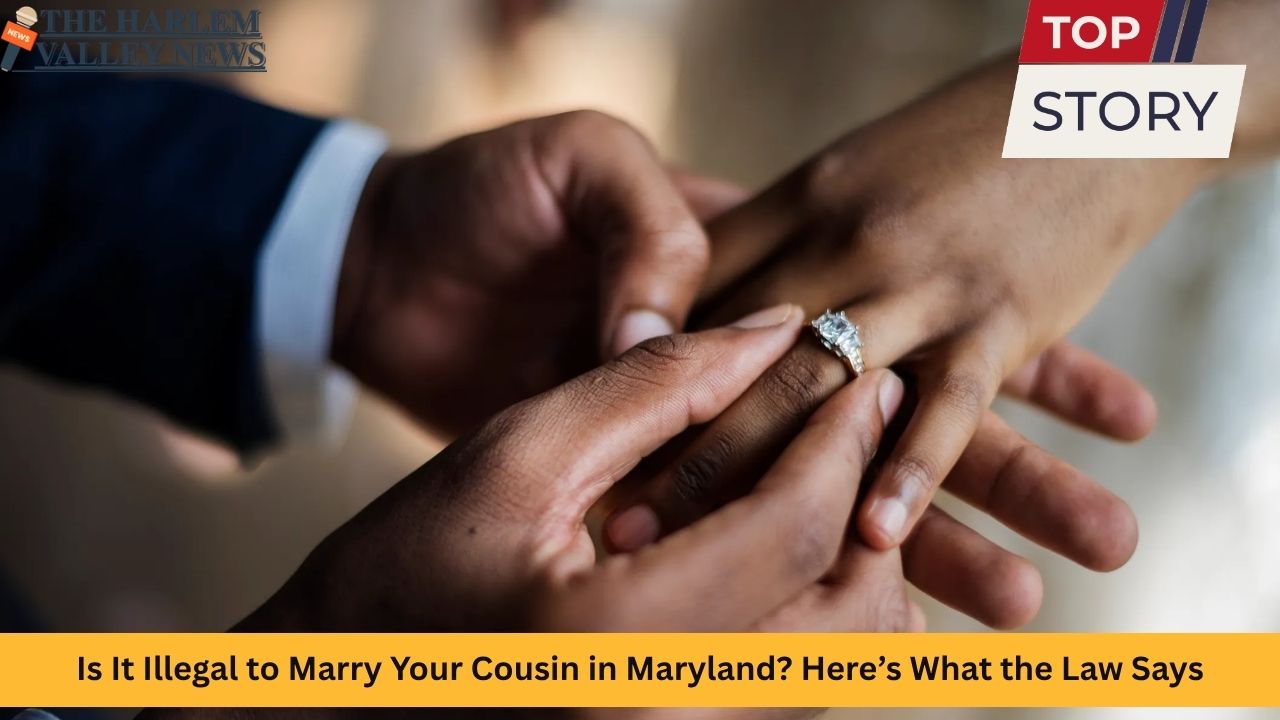Maryland is a state known for its historic cities like Baltimore, Annapolis, and Frederick, its rich colonial history, and its unique mix of legal traditions. Among the questions that often surface in family law is whether it’s legal to marry your cousin in Maryland. This issue is more than an academic curiosity. It has deep legal, social, and cultural dimensions, influencing real couples and families not only in Maryland but also across its borders in Pennsylvania, Virginia, West Virginia, Delaware, and the broader United States.
In this comprehensive guide, we’ll explore what Maryland law really says about cousin marriage, what the statistics reveal, how local communities view the practice, and why this topic continues to grab attention today.
The Legal Landscape: What Maryland Law Says About Cousin Marriage
Maryland’s Marriage Laws Explained
Maryland’s statutory code sets out clear boundaries for who can and cannot get married. Familiar prohibitions, such as marriages between siblings, parents and their children, or even grandparents and grandchildren, are strictly enforced. Stepparents, stepchildren, and certain in-law relationships are also included in these bans.
However, Maryland takes a notably different approach with cousin marriage. While over 20 states in the United States have laws prohibiting marriage between first cousins, Maryland explicitly allows first cousins to marry. This means that couples who are first cousins by blood can legally obtain a marriage license and wed in any city or county in Maryland, including bustling urban centers like Baltimore as well as more rural regions such as Cumberland and Hagerstown.
Understanding Legal Terminology
-
First cousin: Children of siblings.
-
Second cousin: Children of first cousins.
-
Half-cousin: Children of half-siblings.
-
Double cousin: When two siblings from one family marry two siblings from another family and each couple has a child.
In Maryland, marriage between all varieties of cousins—including first and second cousins, half-cousins, and cousins by adoption—is permitted. There are no requirements for genetic counseling, age limits (beyond those that apply to all marriages), or restrictions based solely on the cousin relationship.
The Legal Prohibitions on Marriage in Maryland
While cousin marriage is allowed, Maryland does have a defined list of prohibited marriages. These include:
-
Siblings
-
Parent and child
-
Grandparent and grandchild
-
Stepparent and stepchild
-
Aunt or uncle and niece or nephew
-
In-laws under certain circumstances
Violations of these laws can result in criminal penalties, including fines. By contrast, cousin marriages are not subject to such restrictions or penalties.
Historical and Social Context
Cousin Marriage in the United States
Cousin marriages were historically quite common, especially before the late nineteenth century. The practice is still allowed in 18 U.S. states, while it is either restricted or banned in the remainder. Maryland’s relatively permissive law stands out, especially given its proximity to states like West Virginia and Pennsylvania, where cousin marriage is banned or heavily restricted.
Why Do People Want to Marry Their Cousins in Maryland?
Some couples travel specifically to Maryland to get married, seeking to avoid stricter laws in their home states. In counties such as Allegany and Garrett, which are close to the borders of Pennsylvania and West Virginia, marriage license clerks report that a noticeable portion of their licenses go to out-of-state couples, including those seeking cousin marriage.
Statistics and Trends
According to marriage records, it’s not uncommon for several cousin marriages to be processed each year in various Maryland counties. In some years, 40% of marriage licenses issued in western Maryland counties go to non-residents. Many of these out-of-state couples cite Maryland’s cousin marriage laws as the reason they travel to cities like Cumberland, Hagerstown, or Frederick.
Cities in Maryland and Their Approach to Cousin Marriage
Baltimore
Maryland’s largest city is a hub for both residents and those coming in from other states. Here, cousin marriage is treated no differently from any other legally-sanctioned marriage. Clerks will ask whether applicants are related, but this is a standard procedure and does not disqualify cousins.
Annapolis
As the capital city, Annapolis frequently sees marriage applications from diverse backgrounds. Couples, whether local or from neighboring regions, face a streamlined process if they meet the legal requirements.
Hagerstown and Cumberland
Located near the tri-state area, these cities often see out-of-state travelers coming to Maryland for cousin marriages, especially from Pennsylvania and West Virginia where such marriages are not permitted.
Comparing Maryland to Neighboring States
A key reason why cousin marriage in Maryland receives attention is because policy differs dramatically next door:
| State | First Cousin Marriage Legal? | Second Cousin Marriage Legal? | Notable Exceptions |
|---|---|---|---|
| Maryland | Yes | Yes | None |
| Pennsylvania | No | Yes | Blood relatives limited |
| West Virginia | No | Yes | Step and adoptive allowed |
| Delaware | Only second cousins | Yes | |
| Virginia | Yes | Yes |
This makes Maryland one of the more permissive states in the Mid-Atlantic region.
Important Facts and Stats
-
Over 20 states in the United States prohibit first cousin marriages.
-
Maryland’s law allowing cousin marriage has been unchanged for decades, despite attempts by some lawmakers to introduce restrictions.
-
In western Maryland, as much as 40% of marriage licenses are issued to out-of-state residents in some years, many seeking cousin marriage.
-
Maryland is home to major metropolitan areas like Baltimore, Silver Spring, and Rockville, all following the same cousin marriage laws statewide.
Social Views and Taboos
Cultural Differences
Attitudes toward cousin marriage vary greatly within Maryland’s diverse communities. Among recently arrived immigrant families or longstanding cultural groups for whom cousin marriage is a tradition, the practice is seen as ordinary and uncontroversial. For others, cousin marriage might be viewed as unusual or even taboo. Social acceptance hinges on factors such as religious beliefs, family traditions, and cultural values.
Genetics and Health
Some social concerns about cousin marriage stem from the perception of increased risks of genetic disorders in children born to first cousins. In reality, while there is a slight increase in risk for certain recessive conditions, the absolute probability remains relatively low—about 2% to 3% higher than the population average. For perspective, the baseline risk of birth defects in the general population is about 3%, increasing to about 5% in children of first cousins. Maryland, unlike some other states, does not require genetic counseling or special tests for cousin couples.
Navigating the Marriage Process as Cousins in Maryland
Legal Requirements
For couples interested in marrying in Maryland:
-
Both must be at least 18, or 17 with court approval and parental consent.
-
A marriage license must be obtained from the Clerk of the Circuit Court in any city or county.
-
Proof of identification and social security numbers are required.
-
There is a waiting period—typically 48 hours—before the license becomes valid.
-
No specific disclosure for cousin couples is needed beyond answering the standard question about relationship.
Out-of-State Couples
Maryland does not require residency to obtain a marriage license; anyone can apply. That means couples from New York, New Jersey, or further afield—anywhere cousin marriage is illegal or frowned upon—can come to Maryland cities such as Baltimore, Annapolis, or Rockville and legally marry as first cousins.
Possible Penalties for Violations
Penalties apply only for the prohibited marriages (siblings, parent-child, etc.), not for cousin marriages. In those cases, fines and the voiding of the marriage are the main consequences.
Stories and Experiences Across Maryland
Real Marylanders and Cousin Marriage
In larger cities like Baltimore and Frederick, cousin marriages don’t typically attract much attention. However, in smaller or more traditional communities, there can be curiosity or even gossip about such unions.
Media and Pop Culture
Cousin marriage occasionally draws the attention of local media when lawmakers propose changes to family statutes or when couples arrive from states with stricter laws. Sensational headlines occasionally appear, but for most Maryland residents, cousin marriage is neither common nor a source of major controversy.
Attempts to Change the Law
Over the years, lawmakers in Annapolis have occasionally introduced legislation to limit or prohibit cousin marriage, fueled by public concern or changing social attitudes. So far, none of these bills has succeeded. The status quo persists: cousin marriage is fully legal in Maryland for both residents and non-residents alike.
Genetic Counseling and Public Health
Although Maryland does not mandate genetic counseling for cousin marriage, some couples voluntarily seek advice to understand possible hereditary risks. Johns Hopkins University in Baltimore, recognized for its medical expertise, occasionally provides services to clients from across the state and region interested in learning more about inherited disorders.
Maryland in National and Global Context
Maryland’s position on cousin marriage places it among a minority of U.S. states, aligned with others like California, New York, and Massachusetts. On a global level, cousin marriage remains common in many parts of the Middle East, South Asia, Africa, and even in some European traditions.
Frequently Asked Questions
Are first cousins allowed to marry in Maryland?
Yes, first cousins can marry in Maryland without restriction.
Are there any requirements or extra steps for cousins who wish to marry?
No, cousin marriages follow the standard marriage license process. The only special consideration is the routine declaration of any blood relationship.
Is cousin marriage common in Maryland?
It is not as prevalent as in certain parts of the world, but it does occur. Some counties see several cousin marriages each year, often involving non-residents.
What happens if a marriage occurs in violation of the prohibited degrees?
Such a marriage (for example, between siblings) is declared void, and criminal penalties apply.
Does Maryland recognize cousin marriages performed elsewhere?
Yes, Maryland recognizes legal marriages performed in other jurisdictions, unless they violate core prohibitions under state law.
Conclusion
Maryland stands out in the Mid-Atlantic region and in the broader United States for its permissive approach to cousin marriage. In every major city, from Baltimore to Annapolis, and across rural counties alike, the law allows first and even second cousins to legally wed. While only a small percentage of marriages in Maryland are between cousins, this legal green light draws couples from neighboring states and reflects Maryland’s complex legal and social landscape.
For those living in or considering traveling to Maryland for a cousin marriage, the process is straightforward and free of uncommon restrictions. The state’s unique history and its place at the crossroads of American traditions mean that cousin marriage is legal, accepted in many communities, and likely to remain part of Maryland’s diverse social fabric for years to come.












Leave a Reply